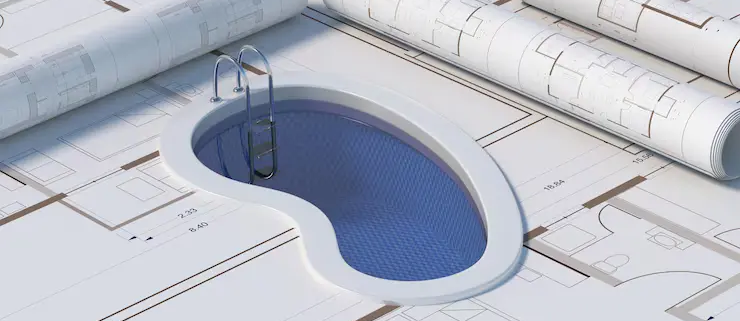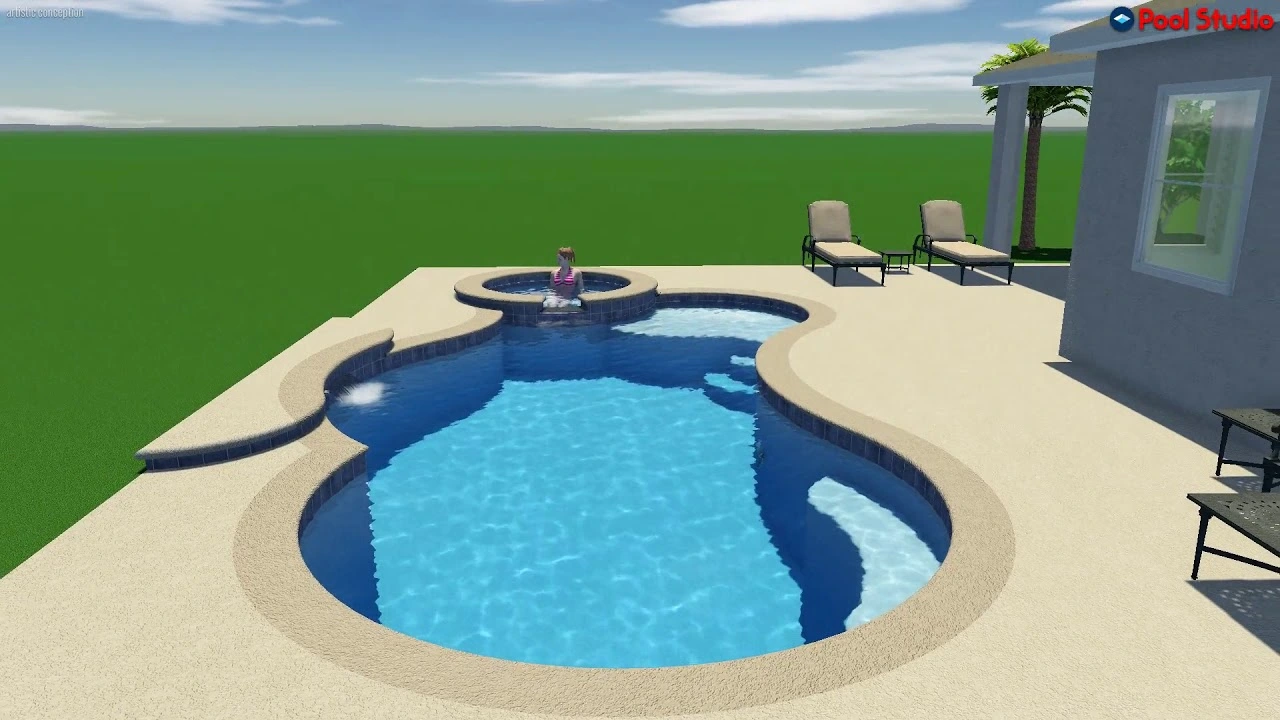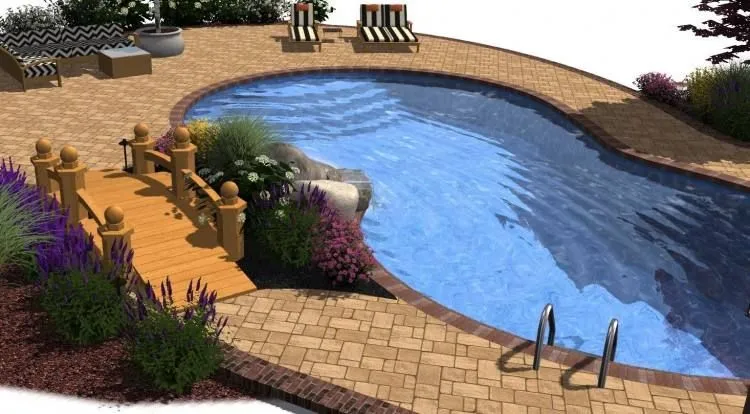11 Best Swimming Pool Design Companies For Drafting And 3D CAD Drawing Services US
The backyard pool business is surprisingly huge and a little bit wild. Recent reports suggest that Americans own roughly 10.7 million pools (about 10.4 million are residential and roughly 309,000 are public or commercial), which means there’s roughly one pool for every 31 people. Builders and designers are still busy. After the pandemic boom cooled, the U.S. is building roughly 60,000 new pools from 2024 to 2025.
This is about half of the 2021 peak. So, it is safe to say that the demand has normalized. The industry also moves real money. For instance, pool construction topped an estimated $9.6 billion in 2024. Due to its steady growth, the number reached $16.5 billion in 2025.
On the tech side, 3D pool-design tools have turned what used to be a hand sketch into instant photoreal scenes. Software like Pool Studio and Vip3D now powers thousands of presentations and helps builders sell the dream before a shovel hits dirt.
So, whether you want quick permit drawings, flashy 3D walkthroughs, or engineering that survives a city inspector’s glare, the right drafting partner matters.
Quick Comparison Table
| Company | HQ / Primary location | Core services | Typical deliverables | Best for |
| Caddrafter (Cad Drafter) | USA (remote / Florida presence noted) | Freelance CAD drafting, 2D permit plans, 3D modeling, renderings, industrial & pool drafting services | Permit-ready 2D plans, 3D visuals, AutoCAD/DW/RVT deliverables, sample CAD library | Residential & small commercial projects that need fast, remote CAD drafting and visualization |
| BIM Modeling US | Dallas, TX, USA | San to BIM, CAD to BIM, MEP plans, 4D BIM simulation, special clash detection reports | Color-coded visual models for pools, plumbing and mechanical elemental models, permit-ready 3D models in RVT, DXG, and PDF | Building Information Modeling and clash detection reports. The experts use special CAD related programs to ensure accuracy. |
| Cad Crowd (marketplace) | Remote / Online marketplace | On-demand freelance CAD & 3D modeling talent; matches clients to experienced drafters and modelers | Contracted freelance DWG/RVT/3D models, short-term drafting engagements, talent vetting | Builders or firms needing flexible freelance capacity or one-off drafting tasks |
| USAquatics, Inc. | Delano, MN | Aquatic consulting, pool design & engineering, Revit/BIM modeling, feasibility and operations consulting | Full schematic construction documents, Revit 3D models, hydraulic/calculation reports | Municipal, therapy, hotel and institutional pool projects requiring BIM and engineering |
| Aquatic Design Partners | Riverwoods / IL (firm) | Full aquatic design & engineering (pools, waterparks, splashpads), constructability & permitting | Engineered construction drawings, hydraulic/structural details, permitting sets | Large commercial, public & waterpark projects needing engineered deliverables |
| Aquatic Design Group | Carlsbad, CA | Aquatic architecture, planning, and engineering for competition, commercial and leisure pools | Pool layouts, mechanical/chemical systems docs, and construction administration sets | Institutional aquatic centers, municipal pools and complex leisure facilities |
| Counsilman-Hunsaker | St. Louis, MO (national offices) | Aquatic facility architecture, planning, engineering, operations consulting and master planning | Schematic design, construction documentation, operations manuals and ADA/code coordination | Competitive venues, university & municipal aquatic centers and large-scale facilities |
| Water Technology, Inc. (WTI) | Beaver Dam, WI | Waterpark and aquatic leisure design, engineering, attraction design and project management | Masterplans, attraction/slide engineering, hydraulic & filtration engineering, construction docs | Waterparks, resorts, and leisure attractions requiring multidisciplinary aquatic engineering |
| American Pool Enterprises | Owings Mills, MD (national) | Commercial pool management, maintenance, renovation; design + construction services through regional offices | Turnkey design-build packages, maintenance programs, renovation drawings | Large property managers, HOAs, commercial facilities seeking integrated operations + design |
| Ramaker & Associates | Sauk City, WI (Ramaker offices) | Architecture & engineering with aquatic/recreation practice for pools, splashpads and waterparks | Architectural plans, aquatic engineering, structural & MEP coordination, project feasibility | Municipal recreation projects and school district pool renovations |
| Martin Aquatic Design & Engineering | Orlando, FL | Resort, themed and destination aquatic design with strong engineering & visualization capability | Resort pool concepts, engineered construction sets, photoreal renderings and specialty systems (Blue Mar Basins) | High-end resort and themed entertainment aquatic projects |
Now that you know all perks and specifics associated with different pool design drafting software, let’s go through all of them for a better assessment.
1. Cad Drafter
Cad Drafter brings modern drafting to the pool deck. We turn backyard daydreams and complex commercial specs into buildable reality using Autodesk Revit, Navisworks, Tekla Structures, and industry-grade AutoCAD. We pair scan-to-BIM, drone photogrammetry, LiDAR captures, and AI-assisted clash detection to create pinpoint accurate models and construction sets.
Augmented-reality previews let clients walk the design before excavation starts. Our crew is distributed across the U.S., able to perform site inspections coast-to-coast and deliver permit-ready drawings fast. All of this, without sacrificing the kind of detail that makes contractors smile.
Pros
- Advanced BIM software expertise
- Nationwide site inspection coverage
- Fast turnaround on deliverables
- Drone and LiDAR precision
- AR previews for easy approval
Cons
- Remote projects need extra coordination
- Additional cost for flashy visuals
- Overkill for very simple pools
2. BIM Modeling
BIM Modeling turns drawings into living, usable digital twins. They build Revit models, run Navisworks coordination, and push into 4D scheduling and cost estimating so trades actually know what to build and when. Point cloud to BIM, drone scans, clash detection, MEP coordination, quantity takeoffs and as-built models are all in the toolbox. Their work ties directly into BIM Level of Development (LOD) standards, making sure projects are accurate and clash-free.
The best part is they operate across major U.S. markets and focus on clean, construction-ready BIM that reduces rework and speeds procurement. Do you have short deadlines? Don’t worry! These guys lean in and deliver!
Pros
- Revit, Navisworks, 4D/5D expertise
- Scan to BIM and point cloud
- Strong MEP coordination capability
- Nationwide project coverage available
- Fast turnaround and clear deliverables
Cons
- Extra cost for small jobs
- Very complex projects take time
- Local permitting is not always included
3. Cad Crowd
Cad Crowd is a global online marketplace that matches you with vetted freelance CAD designers, 3D modelers, and drafting pros. Whether you need a permit-ready AutoCAD plan, photorealistic renderings, or a VR-walkthrough of your pool ideas, they’ve got talent that claims skill in Revit, AutoCAD, Pool Studio, and more. You can pick someone excited about your backyard oasis or someone perfect for a large commercial facility.
But that very variety means quality & delivery speed are only as good as the freelancer you pick. Sometimes communication lags. Sometimes revisions aren’t baked in advance. Still, for many projects, it’s a sweet option if you like flexibility and aren’t locked into one local firm.
Pros
- Gigantic pool of freelancers
- Flexible project size options
- Affordable compared to studios
- Wide software compatibility
Cons
- Quality is uneven across designers
- Communication delays common complaint
- Revisions often extra cost
- Less local site presence
4. USAquatics
USAquatics has been around long enough to know how pools actually work once the ribbon is cut. They don’t just draft pretty drawings but engineer the guts of the system. It includes circulation, filtration, ADA compliance, and code headaches that most designers gloss over. Their staff knows municipal pools, YMCAs, and competition facilities inside and out. If you’re a homeowner, they’re probably overkill, but if you’re running a city bond project, they’ll keep you out of trouble.
Pros
- Strong aquatic engineering expertise
- Excellent with municipal projects
- BIM and Revit proficiency
- Decades of proven experience
Cons
- Expensive for small jobs
- Less focus on visuals
- Long timelines for delivery
5. Aquatic Design Partners (IL)
Aquatic Design Partners shows up where water and practicality collide. Based in Riverwoods, Illinois, they design everything from motel swim pads to splash parks and zoo aquatic habitats. Their work reads like problem-solving. It includes feasibility studies, LEED-aware designs, full construction documents and permitting packages, plus construction observation when the screws go on. If you need a team that treats filtration math with the same seriousness as theming, they’ll do it.
Pros
- Strong engineering and code compliance
- Experience across diverse facility types
- Thorough permitting and construction docs
- LEED and sustainability capability
Cons
- Less focused on residential pools
- Can feel heavy on the process
- Longer lead times
6. Aquatic Design Group (Carlsbad, CA)
Aquatic Design Group has been shaping water dreams since 1984, hailing from Carlsbad, California. They’ve logged over 3,500 projects across 44 U.S. states and about 25 countries. Their wheelhouse is architectural, structural, mechanical, and electrical design services for pools, water features, therapy pools, ornamental ponds, competition pools (even natural-water elements).
They work with parks & recreation, hospitality, schools, and resorts, with an eye on sustainable design. It includes efficient pumps, filtration automation, a choice between variable-speed drives, solar heating, or thermal blankets. They believe lifecycle cost matters as much as the tile’s appearance.
Pros
- Huge portfolio; wide geographic reach
- Deep mechanical & structural engineering expertise
- Sustainable systems built into design
- Handles competition, leisure, and ornamental features
Cons
- Less involved in full AR/VR walkthroughs
- Some projects may feel standardized
- Premium features increase cost modestly
Need help finding the best swimming pool design company?
7. Councilman-Hunsaker (St. Louis, MO)
Councilman-Hunsaker is kind of legendary in aquatics. Established in 1970, their “Aquatics for Life” mantra is more than tag-line. It shows in their audits, master plans, facility design, operations consulting, risk management and even cloud tools like HydroApps for scheduling and maintenance.
They design competition pools, recreation centers, splash parks, and perform feasibility studies that analyze over 200 data points per project. If you want someone who thinks ahead to staffing, chlorine chemistry, building envelope, energy cost, and ADA regs, this is your firm. But yes, they can feel pricey and process-heavy for simpler backyard jobs.
Pros
- Rich experience spanning decades
- Comprehensive audits & operational support
- Excellent code & compliance knowledge
- Strong track record on large public facilities
Cons
- Not a budget option for smaller projects
- Less focus on visual design flair
- Longer lead time because the process is detailed
8. Water Technology, Inc. (Beaver Dam, WI)
Water Technology, Inc. (WTI) has been one of the heavyweights in aquatic engineering and design since 1983. Based in Beaver Dam, Wisconsin, they do far more than pool shapes: think master planning, theming & branding, attraction engineering, water treatment innovation (UV, regenerative filtration), construction administration, marketing consults, and even budgeting that doesn’t feel like guessing.
From indoor waterparks to community rec centers, they engineer for fun and safety. Their portfolio includes international work, big-splash waterparks, sports swimming venues and wellness-oriented waterscapes. If you want someone who cares about water chemistry as much as the slide drop, WTI delivers.
Pros
- Deep waterpark design expertise
- Strong environmental / filtration tech
- Wide international & domestic reach
- Masterplans with branding & theming
Cons
- Costly for simpler backyard pools
- Longer timeline on big projects
- Less hands-on residential focus
9. American Pool Enterprises (Owings Mills, MD)
American Pool Enterprises isn’t just about aesthetics but about keeping pools working beautifully day after day. Founded in 1984 and now the largest commercial pool management and service firm in the U.S., they manage thousands of commercial facilities, oversee maintenance, renovations, repairs, and safety programs like lifeguard training.
Their “Guard for Life” lifeguard program alone hires thousands of guards each season. They serve everything from country clubs and apartments to swim clubs and military housing. If your priority is reliability, safety, and low-worry operations, American Pool is tough to beat. Just don’t expect flashy concept renderings to be their primary push.
Pros
- Outstanding safety & lifeguard programs
- Extensive maintenance & repair network
- Large commercial facility experience
- Reliable operational consistency
Cons
- Less focused on design showpieces
- Minimal 3D visualization emphasis
- Higher cost for custom visuals
10. Ramaker & Associates (Sauk City, WI)
Ramaker & Associates is a mid-size multidisciplinary architecture and engineering firm based in Sauk City, Wisconsin. Still, their aquatics & recreation work spans the entire U.S. Their “experts in fun” tag isn’t just for show: they’ve done rooftop pools, municipal rec center renovations, competition pool certifications, splash pads, waterpark structures, structural foundation work, and even splash features with theming like faux rock.
They offer aquatic engineering, architecture, surveying, structural & MEP engineering, civil site work, all in-house. When timelines are tight, their broad team often pivots fast and keeps projects moving without dropping quality.
Pros
- Full-service aquatic engineering + architecture
- Strong portfolio: waterparks to rooftop pools
- In-house survey & structural expertise
- Good municipal & competitive pool experience
Cons
- Design flair is sometimes conservative
- Fewer AR/VR or flashy visuals
- Possibly slower on small residential jobs
11. Martin Aquatic Design & Engineering (Orlando, FL)
Martin Aquatic builds water features and pool complexes where creativity and engineering shake hands. Founded in Orlando, they’ve delivered nearly 3,000 projects globally, including high-profile works like Blue Mar Basins, resort waterparks, interactive features, lazy rivers, and designs for cruise ships.
Their River Falls Waterpark at the Orlando World Center Marriott, for instance, blends multiple raft slides, a lazy river, zero-entry zones, and LED lighting paired with strong, buildable structuring and mechanical engineering. They think not just “how pretty?” but “how well will this sustain heavy traffic, maintain filtration, comply with standards, and still look stunning ten years hence?” Known for themed waterparks and photoreal renders, they rely heavily on advanced 3D modeling software to bring concepts to life.
Pros
- High concept + engineering balance
- Global & large-scale resort experience
- Outstanding themed & interactive features
- Builds for durability and aesthetics
Cons
- Reserved for big budgets generally
- Less affordable for simple pools
- Lead times are lengthy for the custom features
How To Choose The Right Swimming Pool Design Company For Your Project
The United States is swimming in pools. Around 10.7 million of them, to be exact, with almost all tucked behind homes. About sixty thousand new pools are dug each year. The cost? Anywhere from thirty-five grand for a simple rectangle to six figures when you start talking vanishing edges, tanning ledges, or LED waterfalls. With that many options, the question isn’t can you build a pool, it’s who should design it?
This isn’t a decision you want to wing. The wrong firm can hand you pretty renderings that fall apart when they hit the city’s permit desk. The right one will keep inspectors happy, contractors smiling, and your project moving. Here’s how to choose.
Step 1: Scope It Out Before Shopping
Write down exactly what you want. Heated spa? Zero-entry? Maybe just a straight 40-foot lap lane so you can train without running into pool toys. Be blunt about money, too. The average inground pool costs between 35,000 and 70,000 dollars, but resort-style extras can double that. Decide on your timeline. A backyard job might be finished in the summer. A municipal rec center could take a year or more.
Step 1: Scope It Out Before Shopping
Write down exactly what you want. Heated spa? Zero-entry? Maybe just a straight 40-foot lap lane so you can train without running into pool toys. Be blunt about money too. The average inground pool lands between 35,000 and 70,000 dollars, but resort-style extras can double that. Decide on your timeline. A backyard job might be finished in the summer. A municipal rec center could take a year or more.
Step 2: Demand Real Deliverables, Not Fluff
A proper design package usually includes:
| Deliverable | Why you care |
| 2D permit drawings | You literally can’t build without them |
| Structural details | Keep walls and decks from cracking |
| Hydraulic diagrams | Pumps, filters, and heaters sized right |
| 3D model | Lets you visualize and approve |
| Site scans | Prevent “oops” moments in excavation |
| AR or VR preview | Makes family buy-in way easier |
If a company says “we just do visuals” and can’t produce DWGs or Revit files, that’s a red flag.
Step 3: Peek At Their Toolbox
Ask what software they use. Revit, Navisworks, AutoCAD, Tekla, Pool Studio, Vip3D. If they mention drones or LiDAR scans, even better. These tools aren’t just buzzwords. They catch problems before the concrete gets poured. If they use Revit, Navisworks, or even free CAD software like DraftSight or FreeCAD, that’s a plus
Step 4: Check Their Receipts
Portfolios tell stories. Does their work look like yours? A firm known for waterparks may not be the best fit for a backyard lap pool. Ask for at least one reference from a homeowner and one from a builder who has worked from their drawings. Bonus points if they’ll show you an as-built set of plans so you can see their attention to detail.
Step 5: Ask The Boring Questions (They Matter Most)
Who handles permitting? Do they know your city’s quirks? Public pools often require stamped engineering drawings, and missing that step can stall you for months. Also, ask if they’ll attend permit meetings or if they leave that headache to you.
Step 6: Talk Money And Revisions
No one likes surprise invoices. Insist on a contract with milestones such as concept, halfway mark, permit set, and final. Payments should line up with those stages. Clarify how many revisions are included. And yes, ask about errors and omissions insurance. A real firm will have it.
Step 7: Use Site Checks If Offered
Reality capture sounds futuristic, but it saves money. Drone surveys and LiDAR scans spot slope changes, buried utilities, or other surprises before construction. If a company offers it, consider it cheap insurance.
Step 8: Spot The Flags Early
Here’s a quick cheat sheet.
| Good sign | Bad sign |
| Offers Revit or DWG files | Only gives you PDFs |
| Knows local permit rules | Gives vague answers about code |
| Provides recent client references | Uses only stock photos |
| Can do site scans | No site services at all |
| Has a clear revision policy | Dodges questions about fees |
Step 9: Match Company Personality To Your Project
Some companies are engineers at heart. They’ll sweat water chemistry and code compliance. Others are designers who live for the wow factor and AR walk-throughs. Neither is “better.” It depends on what you want. A busy homeowner on a budget might love a lean drafting firm. A resort or city rec project needs the belt-and-suspenders engineering crowd.
The Final Take
If you think hiring a pool design company is just about picking the cheapest quote, you might be in for a rude surprise. The U.S. pool industry is a $16.5 billion machine, and mistakes can burn through budgets fast. A miscalculated slope, an undersized pump, or a set of drawings that can’t pass the permit office could add weeks (sometimes months) to your build.
The companies worth your time are the ones that sweat the small stuff. These include pipe sizing, soil conditions, and those local rules nobody talks about until it’s too late. Get that right, and the fun part will begin!





